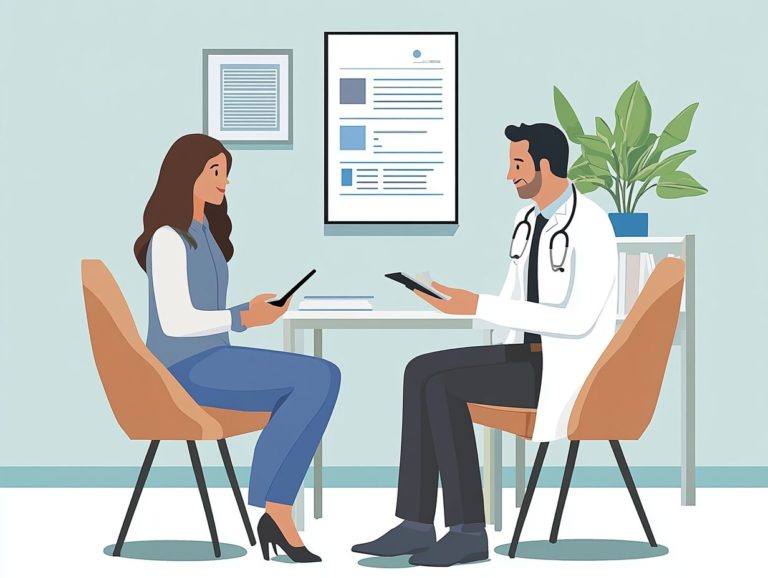What Are the Risks of Not Having Insurance?
Navigating the world of insurance can feel overwhelming. However, understanding its significance is essential for your financial and health security.
This article breaks down the various types of insurance and underscores their importance. It also explores the serious consequences of being uninsured, including financial strain and health complications.
You’ll find a discussion on the factors influencing your coverage options. Insights into government assistance and alternative healthcare solutions available for those without insurance are also included.
With practical tips for effectively navigating the insurance marketplace, you ll feel empowered to secure the coverage you need with confidence.
Contents
- Key Takeaways:
- Understanding Insurance Coverage
- The Consequences of Being Uninsured
- Factors That Affect Insurance Coverage
- Options for Those Without Insurance
- Tips for Obtaining Insurance Coverage
- Frequently Asked Questions
- What are the risks of not having insurance?
- How does not having insurance affect my health?
- What risks do I face as a driver without insurance?
- How does not having insurance affect my financial stability?
- What are the consequences of not having insurance for my business?
- What are the potential risks of not having insurance for my family’s future?
Key Takeaways:

Understanding Insurance Coverage
Understanding insurance coverage is vital as you navigate the U.S. healthcare system, especially if you’re among the uninsured adults. Access to health services is essential for your overall health and well-being.
Many individuals face substantial obstacles due to disparities in coverage and the burden of high healthcare costs. The Affordable Care Act (ACA) Marketplace provides a range of options for insurance coverage. Grasping the nuances of health insurance requirements, cost-sharing, and the financial implications of your choices is crucial.
This knowledge empowers you to protect yourself from unexpected medical costs.
Types of Insurance and Their Importance
You may encounter several types of health insurance, including Medicaid and Medicare. Each is designed to provide essential access to healthcare services and preventive care tailored to your needs.
Private insurance plans, employer-sponsored options, and short-term policies offer varying levels of coverage. This variety is crucial, especially when dealing with chronic conditions. Some plans focus on long-term care, while others address immediate health issues, allowing you to choose what best suits your situation.
It s important to note that the premiums for these plans can vary based on factors like your age, health status, and location.
Many policies emphasize preventive care, encouraging you to prioritize regular check-ups and screenings. This proactive approach can significantly improve health outcomes by identifying potential issues early, ultimately reducing the burden of disease.
The Consequences of Being Uninsured
Being uninsured exposes you to significant health risks and financial consequences, impacting millions of adults in the U.S. each year. Without health insurance, access to essential healthcare services becomes restricted, and you may also wonder, what happens if I don’t have auto insurance? This increases the likelihood of accumulating medical debt from unforeseen expenses.
Studies show that uninsured adults often experience poorer health outcomes, perpetuating a cycle of health disparities and financial instability that can be difficult to escape.
Financial Impact of Not Having Insurance
Not having health insurance can lead to high medical costs. This can be financially devastating.
Without coverage, a sudden health issue can lead to a mountain of bills. Don’t let this happen get informed about your options!
Many people find themselves unable to keep up with mounting expenses. This can result in late fees, collection actions, and even the looming threat of bankruptcy.
The added tax penalties for lacking insurance heighten this strain, complicating an already difficult situation.
Over time, these burdens can chip away at your savings and restrict future opportunities. The long-term financial implications of being uninsured are concerning.
Health Risks and Complications

People without insurance face a higher risk of serious health complications. This is especially true for chronic conditions, which negatively impact overall health.
These risks are even more significant in vulnerable populations, such as American Indian, Alaska Native, and Hispanic communities. They often encounter barriers like language differences and limited access to resources.
Without insurance, many are hesitant to seek necessary care or preventive services. This results in worsening conditions that could have been managed with timely intervention.
Regular health assessments are essential. They provide critical insights into health status and enable early detection of potential issues.
By prioritizing access to care, we can address these disparities and work towards improving health for everyone.
Factors That Affect Insurance Coverage
Several factors determine your insurance coverage. Your insurance status, along with your income and employment situation, are key.
State and federal laws also play a role. They govern health insurance mandates and can greatly influence your options.
Understanding these elements is essential for making informed decisions about your coverage.
Income and Employment Status
Income and employment status are vital in shaping your health insurance coverage. They directly influence your access to care and your ability to pay insurance premiums.
Depending on your income level, you may fall into different income groups. This greatly affects your options for programs like Medicaid and the Affordable Care Act (ACA) Marketplace.
If you have a stable, higher-paying job, you might enjoy employer-sponsored plans. Conversely, lower-income individuals often rely on government programs for healthcare needs.
Fluctuations in job stability can lead to sudden changes in coverage availability. These disparities impact health outcomes and contribute to larger economic issues that perpetuate healthcare inequalities.
State and Federal Laws
State and federal laws significantly shape your health insurance coverage. The mandates established by the Affordable Care Act (ACA) require insurance providers to cover essential health benefits.
However, implementation and additional regulations can vary widely from state to state.
For example, some states have expanded Medicaid under the ACA, enhancing access for low-income individuals.
In contrast, other states have opted against this expansion, leaving many without insurance. This inconsistency creates a patchwork landscape for access to care, especially impacting vulnerable populations.
Ongoing healthcare reform efforts aim to bridge these gaps. Initiatives focused on increasing Medicaid expansion and securing subsidies for low-income individuals seek to ensure that comprehensive health coverage is accessible to everyone.
Options for Those Without Insurance
For individuals without insurance, a variety of options are available to secure healthcare coverage. You can explore government programs such as Medicaid and Medicare, along with alternative healthcare solutions tailored to your needs.
Government Programs and Assistance

Government programs like Medicaid and Medicare offer vital support for those seeking health insurance, especially for low-income and elderly individuals.
These programs aim to ease the financial strain of healthcare costs. They ensure that the most vulnerable among us can access essential medical services without the worry of crippling debt. To qualify for Medicaid, you typically need to meet specific income criteria that vary by state. Medicare primarily serves those aged 65 and older or individuals with certain disabilities.
If you’re interested in applying for these programs, you can easily apply for help through your state offices or online portals, enhancing accessibility.
Coverage through these programs often includes hospital stays, preventive services, and prescription medications. This significantly enhances health outcomes and access to care for millions of Americans.
Alternative Healthcare Options
Alternative healthcare options such as community health centers and clinics with sliding scale fees are essential for providing care to those without insurance.
These services tackle immediate medical concerns and highlight the importance of preventive care, enabling you to maintain better health over time. When access to traditional healthcare is limited, many uninsured adults might overlook routine check-ups and screenings, which can lead to more serious health issues later on.
By taking advantage of alternative resources like telehealth services, wellness workshops, and educational programs, you can effectively bridge the gap in healthcare access. This is particularly vital for underserved populations who frequently encounter barriers related to transportation, cost, and limited knowledge of available resources.
Tips for Obtaining Insurance Coverage
Navigating the insurance coverage landscape can be daunting, but familiarizing yourself with the ACA Marketplace and the specific health insurance requirements can significantly streamline your journey through available options. Taking action now to secure health coverage is important!
Navigating the insurance marketplace established by the ACA can feel like a labyrinth, filled with various health insurance options and an enrollment process that demands your careful attention.
Begin by getting acquainted with the different types of plans available. Understanding the distinctions between HMOs, PPOs, and EPOs is essential, as these choices can significantly influence both your costs and flexibility.
When comparing plans, look beyond just the premiums. Examine deductibles (the amount you pay for healthcare before your insurance starts to pay), copayments, and out-of-pocket maximums to grasp what affordability means for your situation.
Many individuals encounter challenges during enrollment due to perplexing terminology or missing documentation. Creating a checklist can simplify this process immensely. You can explore ways to maximize your benefits like taking advantage of preventive care options and available subsidies to transform your experience into a much more rewarding one.
Frequently Asked Questions
What are the risks of not having insurance?

Not having insurance can leave you financially vulnerable in case of unexpected events, such as accidents, illnesses, or natural disasters. Without insurance, you may have to pay for these expenses out of pocket, which can lead to significant financial strain.
How does not having insurance affect my health?
Without insurance, you might not get regular check-ups or necessary medical treatments. This can leave serious health issues undiagnosed.
What risks do I face as a driver without insurance?
Driving uninsured is illegal and risky. If you have an accident, you’ll pay out of pocket for damages and could face fines.
How does not having insurance affect my financial stability?
Lacking insurance can lead to surprise medical bills that drain your savings. This can hurt your credit score and financial health.
What are the consequences of not having insurance for my business?
Operating a business without insurance exposes you to lawsuits, property damage, and employee injuries. You could end up paying for these events yourself.
What are the potential risks of not having insurance for my family’s future?
Without insurance, your family may struggle financially if something happens to you. They could face challenges covering daily expenses and education costs.






